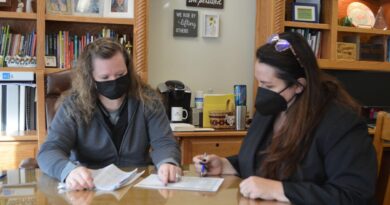Investing in a universal COVID-19 vaccine would be worth it
× close
Four years into the COVID-19 pandemic, the disease is still responsible for more than 3,000 U.S. deaths a month, according to the Centers for Disease Control and Prevention.
To date, the public health strategy has been that once a wave of deaths occurs due to a COVID-19 variant, a new vaccine is developed to suit its prevalence. But over time, the variant subsides, and a new variant emerges.
And interest in boosters has also waned, as only 17% of the U.S. population has received the updated bivalent COVID-19 booster dose, as compared to the uptake rate of over 50% population for the first U.S. approved booster in 2021. Investing in a universal COVID-19 vaccine would be much more beneficial than the current approach of relying on variant-specific boosters, according to new Dartmouth-led research.
The study examines the potential effectiveness of a universal COVID-19 vaccine in relation to COVID-19 deaths that the country has been experiencing since the onset of the pandemic (known as “background mortality rates”) and those from new variant waves.
The findings are reported as part of the National Bureau of Economic Research Working Paper series.
“Although it may sound fanciful, the possibility of developing a universal COVID-19 vaccine is real,” says senior author Christopher Snyder, the Joel Z. and Susan Hyatt Professor of Economics. “Scientific advances have suggested ways to attack the virus that are generalizable enough to cover any one of the pathogens within the family.”
“The key value of a universal COVID-19 vaccine is that it could anticipate future variants rather than always lagging. It would be more effective and could require fewer boosters,” says Snyder. “If it puts us in a ‘one and done’ situation, that might actually help with vaccine hesitancy.”
“So, this type of vaccine could be a win in that regard and help renew people’s confidence in vaccines,” says Snyder.
The researchers set out to determine if a universal COVID-19 vaccine is worth the investment.
They applied some of the same techniques that their team used in an earlier study on the pandemic that estimated the value of adding more capacity to produce existing COVID-19 vaccines.
While a COVID-19 vaccine helps mitigate risks of getting sick, missing school and work, and economic losses, the study focused on mitigating deaths, in this case mortality harm from COVID-19.
To compute the extra benefits that could be obtained from developing a universal COVID-19 vaccine relative to the status quo of relying on variant-specific boosters, the team ran a series of projections. They played out possible scenarios that simulated when future variants of concern would emerge, waves of deaths to follow, and whether a successful booster or a generalized vaccine is available in advance before the wave hits, or the pandemic ends, while also assuming that the background death rates continue until a new variant emerges.
More information:
Rachel Glennerster et al, Quantifying the Social Value of a Universal COVID-19 Vaccine and Incentivizing Its Development, (2024). DOI: 10.3386/w32059




